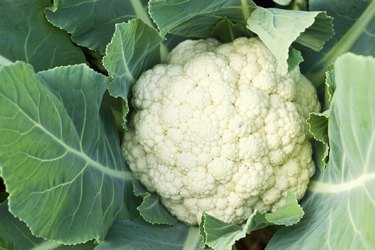
Cauliflower provides essential vitamins, minerals and nutrients, but it can also cause stomachaches or abdominal cramps. The culprit behind the stomachaches is cauliflower's fiber content, which becomes most troublesome when you increase your fiber intake too rapidly without giving your body time to adjust. Stomachaches join other side effects of overloading on fiber.
Fiber Basics
Video of the Day
Fiber is an essential dietary component found naturally in fruits, whole grains and vegetables such as cauliflower. Fiber helps with digestion and absorption of nutrients and gives you a feeling of fullness, which can result in eating less and losing weight. Fiber can also lower your cholesterol levels, decrease your risk of diseases such as type 2 diabetes, certain cancers and heart disease. Moderation is key, however, as rapidly increasing your fiber intake can cause side effects.
Video of the Day
Side Effects
Stomachaches are just one side effect from eating large amounts of cauliflower or other fiber-rich foods. Other side effects include gas, bloating and diarrhea. The most effective way to sidestep the side effects is to increase your fiber intake slowly. The Family Doctor website suggests increasing your fiber intake with a single change, such as a regular addition of cauliflower or other fibrous food, and then letting your body adjust for up to a week before making a second change. Drinking water also aids in fiber digestion.
Cauliflower Basics
All forms of cauliflower contain high amounts of fiber, whether you eat it cooked, or raw, or go for fresh, or frozen. A 100-gram serving of cauliflower contains 2.3 grams of fiber. That same serving of cauliflower also contains 23 calories, 4.11 grams of total carbohydrates made up of fiber and sugars, 1.84 grams of protein and 0.45 grams of fat.
Considerations
The recommended daily fiber intake varies by age and gender. Women age 50 and below need at least 25 grams of fiber, while women 51 and above need at least 21 grams. Men age 50 and younger require 38 grams of fiber and those 51 and older should consume 30 grams. Beans are at the top of the fiber content list for vegetables, while other good sources of fiber include whole grains, brown rice, artichokes, legumes and sweet potatoes.
When To Call Your Doctor
If your stomach pain does not go away, you should know when to contact your doctor. If your stomach pains are sudden and sharp; accompanied by pain in your chest, neck or shoulder or tenderness in your abdomen, the National Institutes of Health recommends you seek immediate medical care. Other situations that require emergency attention are if you have stomach pain and you are pregnant, undergoing cancer treatments, have difficulty breathing, vomiting or have signs of internal bleeding such as black or tarry stools.